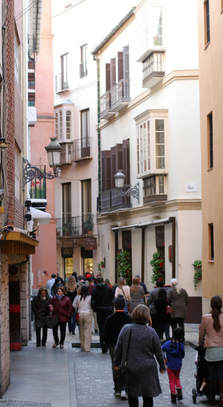 We wandered in to this Catholic church yesterday. It is one of 30+ churches in Antequera...a town of 40,000. It was built in the 1600s. There was a woman manning the door and collecting €1 from anyone who came to visit. In talking with her, we learned that this is one of many churches in Antequera that are no longer in use. "Its not a church any more, just a museum of sorts. There weren't enough people in the congregation to keep it going and not enough money to run a church. No more weekly services. You can pay to have a wedding here. But the only mass they hold is on Easter morning, only for tradition," she explained. "It was still open when I was a young mother. But it just slowly died. Now it's just for tourists to see. That's why I'm here - to let the tourists in." This is what is happening all over Europe. "Religion - Many Europeans are proud of it. Some think it is too bad. However, both agree: Europe is a secularized continent. Europeans do not go to church anymore, they do not believe in God anymore, and they do not seem to be religious at all. Are these assumptions true?” To find out more, go to the European Values Study at www.europeanvaluesstudy.eu “It is obvious that a vast majority of all the Europeans nominate themselves as religious persons. There are even more people who consider themselves as religious as there are people who attend church. It is a kind of 'believing without belonging'. People pick and choose religious beliefs, doctrines and practices and they are mixing and matching them, as they would select food in a cafeteria. Sociologists talk about this trend as a 'cafeteria religion', or as 'church-free spirituality'. Europeans remain religious, their approach is eclectic, and they borrow ideas from several traditions. Meanwhile many institutionalized churches, especially in the West, are running empty.” Some other findings regarding Spain: · While a majority of Spaniards believe that there is a god or supreme being, only 50% of Spaniards felt that God holds any importance in their lives. · Only 10-19% of Spaniards feel happy with their life · In studies related to tolerance, people in the European South would rather have criminals and heavy drinkers for neighbors than Roma people (Gypsies) - a population that numbers 1 million in Spain. Among the 12 categories given, only drug addicts outranked the Roma as unwanted neighbors.
0 Comments
"These are the best scones I’ve ever had! They are just perfect – just the right consistency and flavor, density and fluffiness. Amazing, Carmen!” Those were my exact words to a friend recently as we visited them in their home for breakfast. I’ve only tried to make scones a couple of times, but they just seemed crumbly and dry and less-than-awesome. I decided that I wasn’t cut out for scone baking, or that the fault was in the difference in local ingredients for the recipe. Yet, here was my friend using those same local ingredients and getting great results. What’s up? Where was I going wrong?
“I think the trick is in the timing of the dough. Honestly, this is the first time they have been this good for me. But I gave them the appropriate amount of rest this time. Usually I’m in a big hurry and I need results quick, so I skip the rest period for the dough, or I cut it short and only give them a little 10-minute quick rest instead of the 30-40 minute suggested period. That’s the only thing I did differently, and it really seems to have made a difference!”, Carmen recalled. Not being too knowledgeable of a baker when it comes to dough products, I accepted this explanation as truth. “Good to know!” But Carmen’s husband stepped up to the plate, no pun intended, and explained in a little more depth. “The reason for the ‘rest’ is that the ingredients need to spend some time together. They are all mixed up together, but they haven’t truly had any time to incorporate with each other. They need time for the transformation to start occurring. The water molecules need a little time to truly be absorbed by the flour, and the dough needs a chance to relax. When you mix it up and knead it together, you have put it under some ‘stress’ by forcing the ingredients to mix. When you give it some time, it relaxes, it gets softer, it becomes more pliable and tender and the ingredients start to work together and become one. If you rush that process, you get tough dough or chewy dough or dough that is too crumbly and falls apart. Some things you just can’t rush.” Okay, point taken. Juan had activated my science brain and this was making loads of sense now. Both Carmen and I are pretty results-oriented and efficiency-driven. If you can do something with fewer steps or in less time, we are going to figure out how. But this dough situation, this was something that needed more time and couldn’t be rushed. This was about chemistry. And the proof was right there in front of us on the plate. I continued to think on the science of the dough during the following week. On Thursday, we hosted our weekly breakfast fellowship and bible study. Daniela was discussing how close she has become with the women in her gym class. This is a huge celebration, for many reasons. Spanish culture has pretty tight friendship circles. Most people in our small town have known each other all of their lives. Children start school together at the age of 3 and they remain with the same classmates in the same class all the way through to high school graduation, with very few exceptions. Communities and neighborhoods are close-knit networks. Family fabric is woven tight. Therefore, women in their 40s or 50s have been with their same friend group since they were toddlers! This makes it hard to ‘break in’ to a friend group and find true acceptance and community. Daniela is an “outsider”, like myself. She moved here the same year we did – 2013. Not only is she and newcomer, but she is not a Spaniard. Making friends can be really tough. But Dani has done it, and done it quite well. She is not only accepted in this group of women, but she is sought after. They miss her and check on her when she misses class. They ask her advice on things. They text like their thumbs are on fire. They go out on coffee dates. Some have even started to have breakthrough conversations regarding faith. And not only in this group is Dani experiencing this kind of progress with relationships. She has become an active part of the school parent groups, too, and is now friends with many parents and teachers in the school and is becoming a respected leader in that circle. But all of this took time. A LOT of time. Four years of time. So this is truly something to celebrate! And it suddenly dawned on me… this is exactly what our work in Spain is like. This is what living life in community in Europe is like. It’s like baker’s dough. People need time to be together. Relationships are formed through time. People need time with together, time to absorb the essence of each other, time for the chemistry of each other’s personalities to meld together and find a place of understanding. It takes time to build trust. It takes time to let down the guard. Remember the dough? Remember what happens without the time element? The dough stays stressed and tough or it falls apart. But if you give it time, it relaxes, it gets softer, and it transforms in to something more delicate and tender. So often, we have watched workers come to Europe with efficiency and agendas on their mind. They have a plan and they are driven for quick numbers. We have witnessed the pressures of sponsors and churches and agencies who want to see results. But that’s just not how the Kingdom works. And that’s certainly not how life in Spain or Europe works! Because relationship takes time. Yeast takes time to rise and do it’s work. Trust and community takes time to build. The way I see it, if Jesus could spend three years walking alongside the disciples and teaching and hanging out sharing meals and being a living breathing example, showing them all the things he did, and yet they STILL were questioning and wondering and trying to understand him and his life – well then, I think Jesus probably understands that we can’t rush relationships and faith, either. |
Laurie DrumIn my USA life, I was a teacher in Texas for 15 years. I was also a professional photographer, a soccer mom, a horsewoman, and the neighborhood hospitality queen. I did "Joanna Gaines farmhouse style" before Chip and JoJo were even a thing - we restored an 1884 Victorian farmhouse in small town Texas and did shiplap walls until I thought I'd go crazy. I taught at NASA, scuba dived with astronauts in training, and studied animals at Sea World for educational purposes. I've tried just about everything, because I have an insatiable need to know if I can do it! Never underestimate a Texas girl in cowboy boots! In 2006, my husband Billy and I became cross-cultural workers (CCWs) with TMS Global. For five years, we served in three rural Quechua Wanca villages in the Andes of Peru. And when I say rural, I mean RURAL - like no potty! I spent my days in Peru learning to live a Quechua lifestyle in a rustic adobe house - cooking Peruvian foods, sewing with Quechua women, raising my chickens and goats and pigs, and planting my gardens. Now I live my life in small town Spain, serving other cross-cultural workers via teaching and training and care, and helping displaced people to navigate their new reality in Europe.
I'm passionate about fostering personal growth, growth in community, and growth in The Kingdom. Walking alongside others and helping them to use their unique design, their gifts and strengths and maximize their abilities to fulfill their God-given purpose - that's what makes my heart sing! Archives
March 2024
Categories |
What We Do About Us Media Contact Us
Copyright © 2013 ~ Billy Drum, 4717 Shoal Creek Dr., College Station, TX 77845 ~ 979.985.5238


 RSS Feed
RSS Feed

